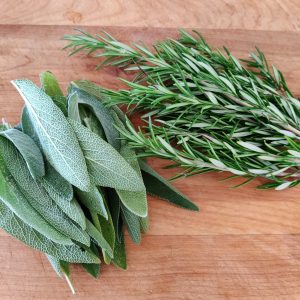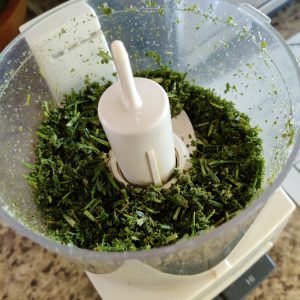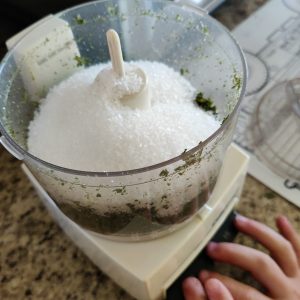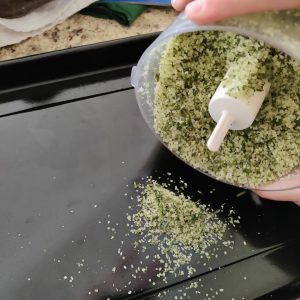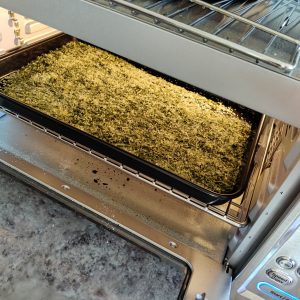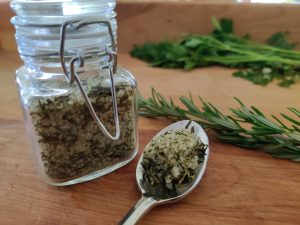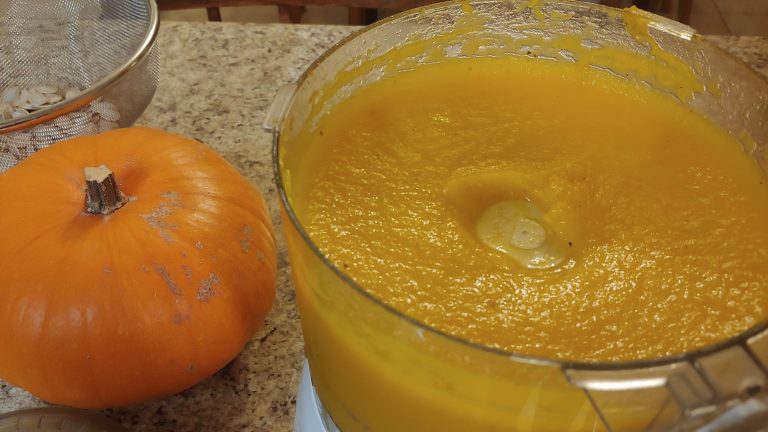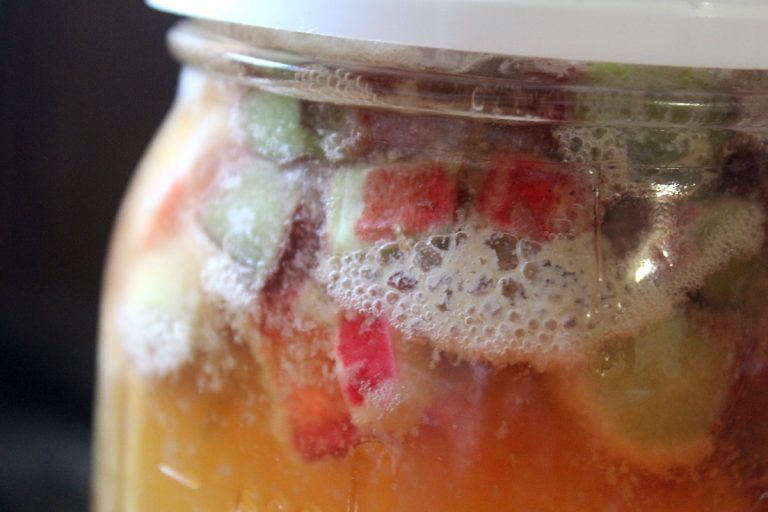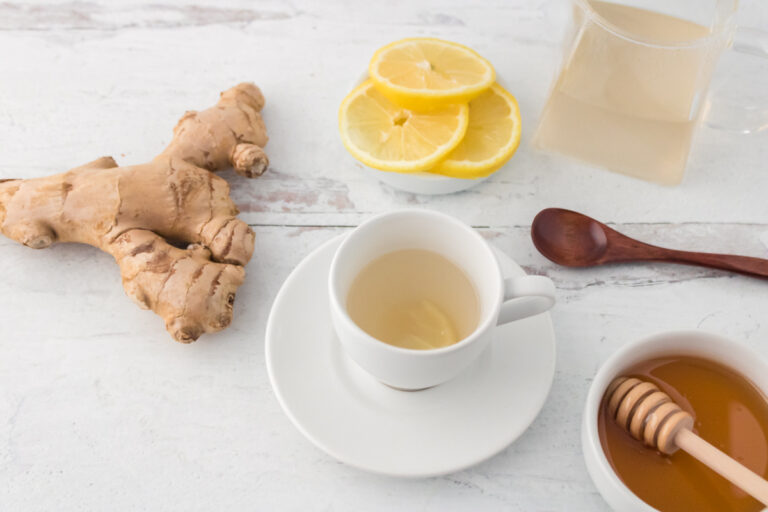This post may contain affiliate links.
Seasoned salt is a type of salt flavored with herbs or spices. It can be used for various purposes and is very easy to make. I love to make homemade seasoned salt with fresh herbs from my garden when they are in season.
You can make a unique seasoning all on your own by combining different herbs.
Here’s how you can easily make seasoned salt at home.
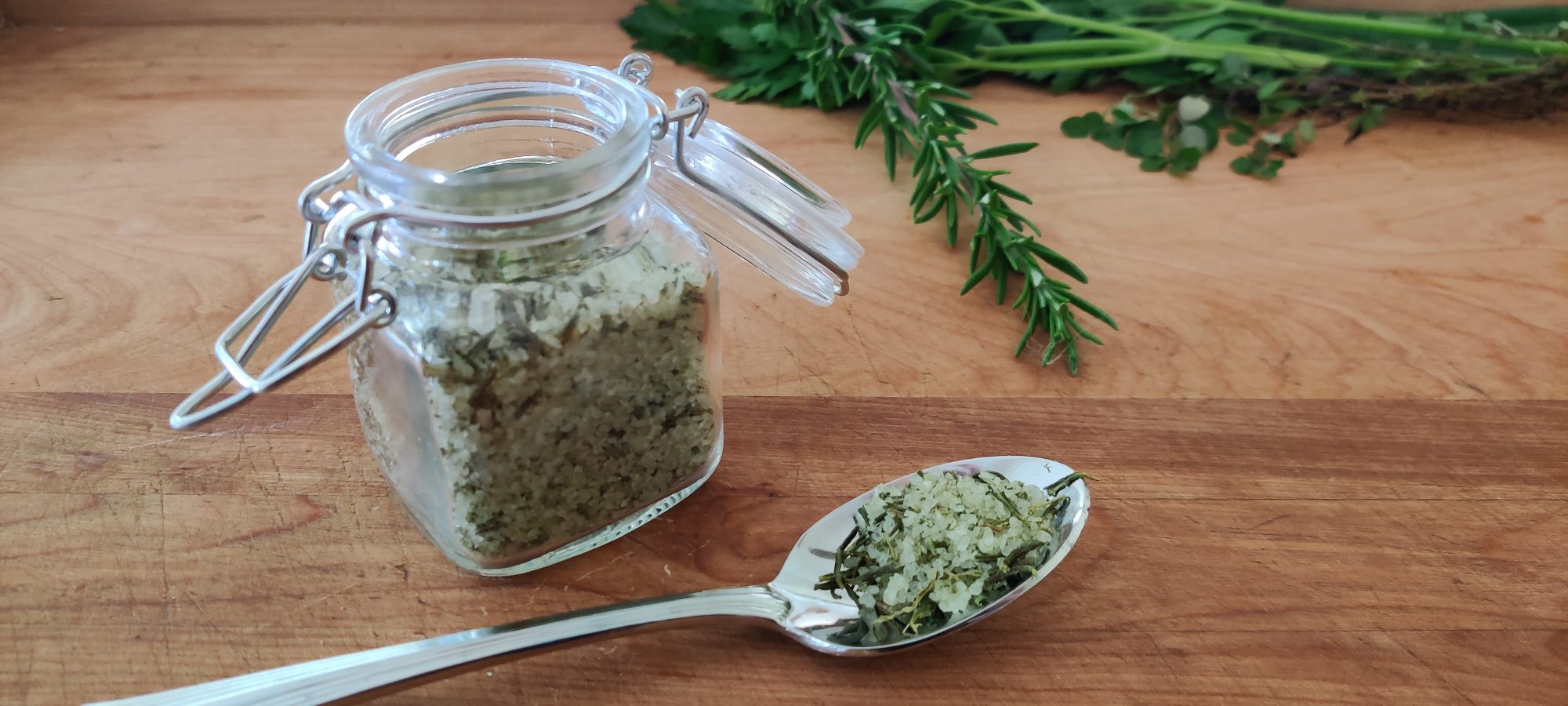
Equipment and Materials Needed
Equipment
- Food Processor
- Sheet Pan
- Oven or Toaster Oven
Materials
- 1 cup salt, preferably chunky or flaky sea salt with plenty of texture
- 3/4 cup fresh herbs as leaves
Seasoned Salt with Fresh Herbs: Step-by-Step Instructions
Step 1
Preheat your oven or toaster oven to 250 degrees.
Step 2
Pick your herbs when fresh and dry and at their prime flavor. You’ll use about 3/4 cup of fresh herb leaves for this recipe.
Some great combinations include: sage + rosemary (for a fall-like flavor); basil + oregano + thyme + parsley (for an italian blend). Remove from the stem to use mostly leaves.
Step 3
Place your fresh herb leaves in a food processor, blender, or mini chopper. Pulse about ten times till you have nice, small, chopped-up pieces. Don’t pulse too long, or they will get mushy.
Step 4
Add your salt to the food processor and pulse about five times to blend the salt into the herbs. Again, don’t pulse too much, or you risk losing the texture of your chunky or flakey salt. Just make sure the herbs are well distributed throughout the salt.
Step 5
Pour the seasoned salt mixture onto a sheet pan (or half sheet pan) and gently shake the pan to distribute into a wide, thin layer.
Step 6
Bake your seasoned salt for about 15 minutes, giving it a little shake or stirring halfway to avoid getting chunks. Ensure the salt is dry; if it still feels damp, give it 3-5 more minutes in the oven.
Step 7
Allow the seasoned salt to cool, then pour into air-tight jars using a funnel.
Grab Homemade Labels from the Shop
We’ve curated the perfect labels to help you get organized. Designed to bring simplicity and elegance to your spice collection. These Jar Labels will transform your spice storage and add a touch of minimalist charm to your kitchen.
Seasoned Salt Frequently Asked Questions
How do you make seasoned salt?
The simplest way to make seasoned salt when using fresh herbs is to chop them in a food processor, combine them with a flakey or large sea salt, then bake them at a low temperature.
What kind of salt is best for seasoning salt?
I typically use salt that is larger in size and strength for my seasoned salt – like kosher salt or large flake sea salt. When lightly blended, these salts will hold their own and make for a nice “finishing salt” when used on the table.
What kind of herbs can I use for seasoned salt?
The sky is the limit when choosing herbs for seasoned salt. Any green, leafy herb that can be chopped up will work. That said, some combinations work well together.
For example, sage and rosemary are great fall flavors with various roasted veggies or meats. Basil, oregano, thyme, and parsley make a nice Italian combination sprinkled on bread, pizza, or pasta. Be creative and try a few variations for fun – test them yourself to see what you love.
Can I use fresh herbs for seasoned salt?
Yes! We prefer making our seasoned salt with fresh herbs because you can be sure that they are combined at their peak flavor. In addition, when making a seasoned salt combination recipe, cooking all of your herbs and salt together will infuse the flavor throughout the finished product.
Can I use dry herbs and spices to make a Seasoned Salt?
Of course! You can always combine dried herbs with salt to make your chosen blend. This also works for spice blends. We feel like using our fresh herbs makes the seasoned salt uniquely ours because they come right from our garden and are blended on the spot. But a dry herb seasoned salt blend is also yummy.
If you do this, you do not need to bake the blend. A mix of spices can be yummy when gently roasted on the stovetop, such as this Middle Eastern spice blend – toasting or cracking the spices allows their flavor to emerge. The recipe we include here is for using fresh herbs that need to be dried out.
How do you use seasoned salt?
You can use seasoned salt on vegetables, meats, or even in (or on top of) bread. The key to using seasoned salt is not to overthink it! Try your salt on practically anything you make for dinner and see if you like it. This great kitchen staple can be used when cooking or as a finishing touch on a served meal.
That said, some seasoned salt blends are better on different foods, depending on the theme of your dinner.
If you are eating Italian, go for a blend of basil, oregano, and thyme. You can go bolder with rosemary and sage if you cook meat or roasted veggies. A seasoned salt with Middle Eastern notes (like coriander, cumin, etc.) would be delicious in curry or roasted chicken.
How do you store seasoned salt?
Homemade seasoned salt should be stored in an air-tight container. Assuming you have removed all the moisture from the herbs, it will last quite a long time. Like most herbs, it can lose its flavor over time, so don’t be shy about using it frequently!
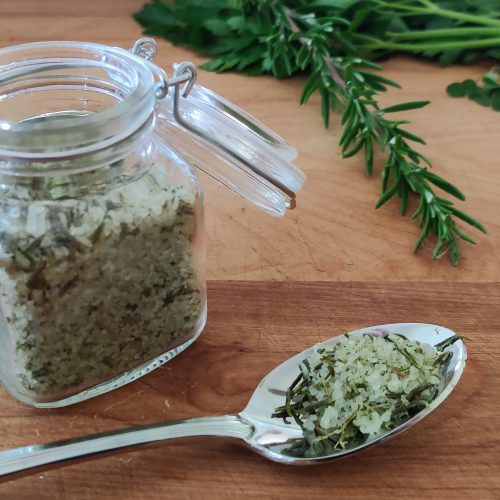
Seasoned Salt with Fresh Herbs
Equipment
- Food Processor
- Sheet Pan
- Oven or Toaster Oven
Ingredients
- 1 cup salt preferable chunky or flaky sea salt with plenty of texture
- 3/4 cup fresh herbs as leaves
Instructions
- Preheat your oven or toaster oven to 250 degrees.
- Pick your herbs when they are fresh and dry and at their prime flavor. For this recipe you'll use about 3/4 cup of fresh herb leaves. Some great combinations include: sage + rosemary (for a fall-like flavor); basil + oregano + thyme + parsley (for an italian blend). Remove from the stem to use mostly leaves.
- Place your fresh herb leaves in a food processor, blender, or mini chopper. Pulse about 10 times till you have nice, small chopped up pieces. Don't pulse too long, or they will get mushy.
- Add your salt to the food processor and pulse about 5 times to blend the salt into the herbs. Again, don't pulse too much or you risk losing the texture of your chunky or flakey salt. Just make sure the herbs are well distributed throughout the salt.
- Pour the seasoned salt mixture onto a sheet pan (or half sheet pan) and gently shake the pan to distribute into a wide, thin layer.
- Bake your seasoned salt for about 15 minutes, giving it a little shake or stir half way to avoid getting chunks. Check to be sure the salt is dry; if it still feels damp, give it 3-5 more minutes in the oven.
- Allow the seaseoned salt to cool, then pour into air-tight jars using a funnel.
Carrie Williams Howe is an educational leader by day and an aspiring homesteader by night and weekend. She lives on a small homestead in Vermont with her husband, two children, and a rambunctious border collie. She blogs about her family's homestead life at The Happy Hive.

